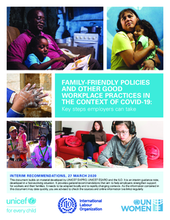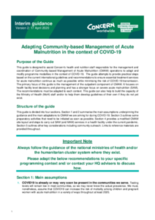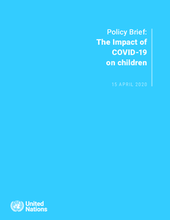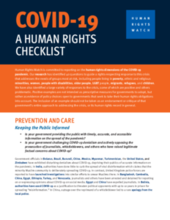Displaying 1471 - 1480 of 4424
In this joint statement, Henrietta Fore, UNICEF Executive Director, and Filippo Grandi, UN High Commissioner for Refugees, share UNICEF and UNHCR's commitment "to do more — and better — in this crisis and beyond for refugee children, their families and communities, and those who host them."
This preliminary technical note from UNICEF, ILO, and UN Women offers (interim) recommendations for employers to mitigate the negative consequences stemming from COVID-19.
This guide is designed to assist Concern's health and nutrition staff responsible for the management and coordination of Community-based Management of Acute Malnutrition (CMAM) operations to adapt and modify programme modalities in the context of COVID-19.
This statement from the United Nations Special Representative of the Secretary-General on Violence against Children calls for solidarity in light of the COVID-19 pandemic to ensure that no child is left behind.
In this statement, the UN Secretary-General registers concern regarding the well-being of the world’s children during the COVID-19 pandemic and notes the launch of a report that highlights the risks they face.
This policy brief provides a deeper analysis of the effects of the COVID-19 pandemic on children and offers immediate and sustained actions for the attention of governments and policymakers.
In this webinar, Jamie Lachman, co-founder of the Parenting for Lifelong Health initiative, provides an overview of the open-source online COVID-19 parenting resources initiative and the current response to COVID-19, including a presentation of current resources to promote child protection and different strategies that are being used to disseminate them worldwide.
This webinar on protecting vulnerable children and families during a global pandemic will be presented by Dr. Delia Pop, Director of Global Programmes of Hope and Homes for Children.
This checklist presents 40 questions to guide a rights-respecting response to the COVID-19 crisis that addresses the needs of groups most at risk, including people living in poverty, ethnic and religious minorities, women, people with disabilities, older people, LGBT people, migrants, refugees, and children.
This article lists 10 issues that should be addressed in the effort to provide emergency child care for at least part of the workforce, promoting the safety and healthy development of young children while supporting those working in emergency settings.




